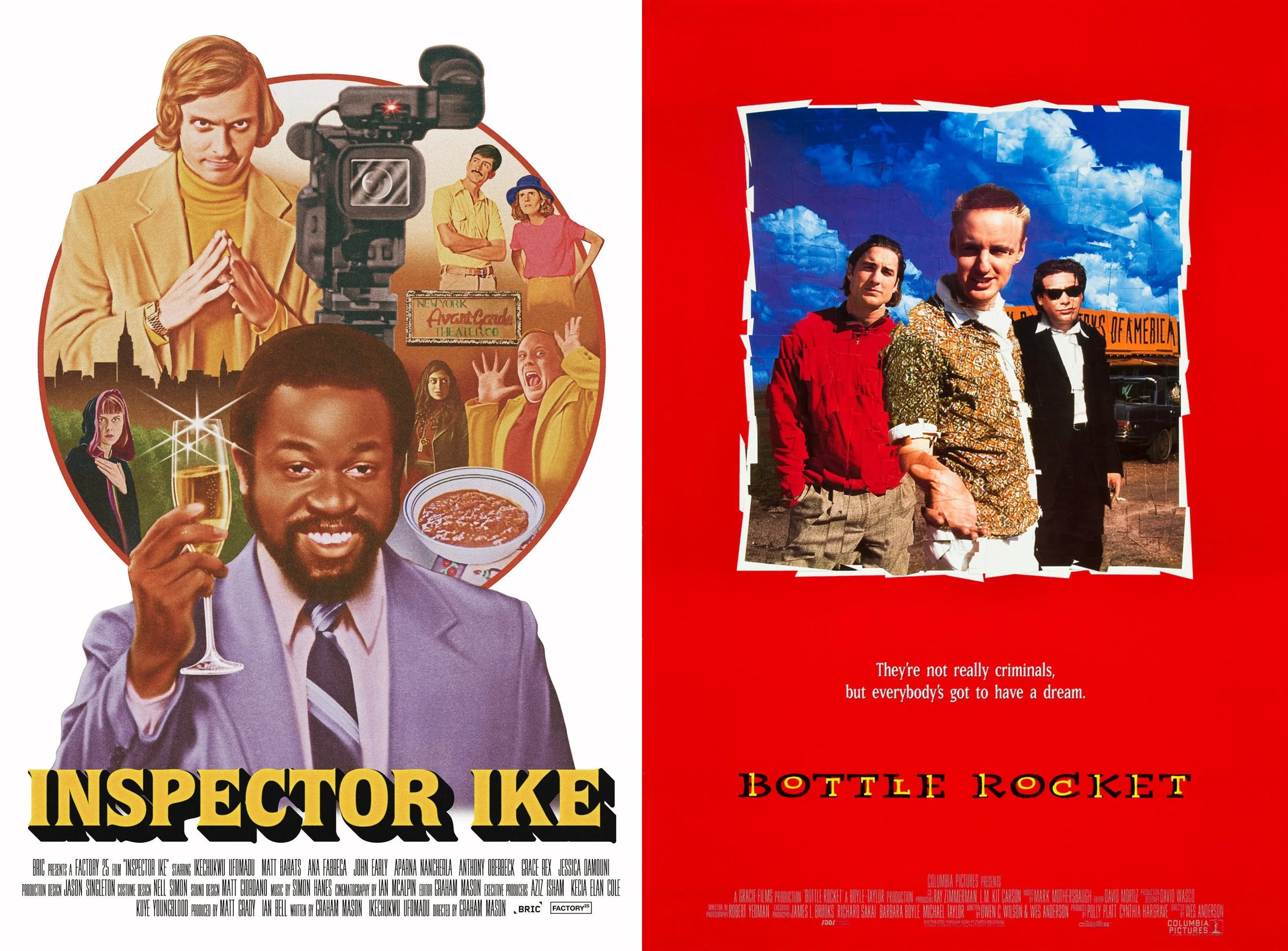April's Jewels: An Alternate Hyperreal Calendar
No goofs, no japes. Just a spring reminder that the pollen is in the air and the members of the monarchy are in the guillotine. Snakes, sex, leather, and chili—you can’t say we don’t give the people what they want here at Hyperreal Film Club. If you’re looking for more movies to wow you before we start heading into the summer months, our dynamite contributors have once again come together to offer an Alternate Hyperreal Calendar for April. Donkey princesses, Oscar winners, snuff films, plenty of other eclectic choices from the very best film club in Austin.
Marie Antoinette—Peau d’âne (Donkeyskin)
Around the time of the Marie Antoinette screening at the beginning of this month, I heard a compelling argument about the tragedy of monarchy restated. By all accounts a brutal, grotesque, medieval, unjust system of government for those ruled, it imposes the impossible task on monarchs as well. Their position requires their true identities to be subsumed within their public role, sacrificing a human life for a royal one. Marie Antoinette is often happy, only rarely fulfilled: she’s hardly given a chance to be a human, let alone to be anything other than the kind of person desired by those she’s been (literally) given to.
I’d like to imagine Catherine Deneuve’s eponymous princess from the 1970 Jacques Demy disco fairytale Peau d’âne (Donkeyskin) would be a good comrade for Marie. Recognizing a fellow royal in dire need of a fairy godmother, she could impart something about militant self-care, pastoral escapism, and giving a hard “no” to bad marriage proposals. The two movies both are distinguished by their vibrant soundtracks, perfect matches for the material and their respective eras—Marie Antoinette was, despite its subject matter, a quintessential US-in-2006 vibe in the same way that Donkeyskin feels inexplicably like the distilled essence of what it was to be French in 1970. Absurd opulence (come for the donkey who shits gold, stay for the helicopter), dopey princes and kings, and abrupt endings characterize both films, although the day-glo special effects and visual flourishes of Donkeyskin really are in a league of their own.
Girl 6—Sorry to Bother You
What did you like best about Girl 6? The comedic framework of a sex hotline? An experimental black director coupled with a talented black lead? Well, where Girl 6 gives you Spike Lee directing Theresa Randall as a phone-sex operator, Sorry to Bother You gives you Boots Riley directing LaKeith Stanfield (Darius in Atlanta) as a telemarketer. Both stories follow professional and romantic failures who lose themselves to fantasies enabled by the ability to recreate themselves via anonymous phone calls. Both films feature celebrity cameos, singular soundtracks, “white voice,” surreal cuts, and bizarre imagery, whether it’s turn-dial phones raining from the sky or rampaging minotaurs. Like Girl 6, Sorry to Bother You will have you laughing hysterically while you repeatedly fail to guess to what will happen next.
Green Snake—The Lair of the White Worm
Late 1980s oddity The Lair of the White Worm actually features a great deal more snake-fu than Tsui Hark’s fantasy-action fable Green Snake. Based on Bram Stoker’s novel, LOTWW matches the Hong Kong film’s penchant for stylized maximalism, but from a much different angle. Both films feature banger musical numbers, high-energy camp atmosphere, unconvincing yet stylish practical effects, and surprisingly resonant themes of religious dogma gone awry. But Green Snake presents its human and shape-shifter characters as sharing the same reality, while in LOTWW’s vision of the British countryside, the authorities dismiss the supernatural to the dustbin of myth, giving the monsters the advantage.
LOTWW follows an archeologist who unearths a strange dinosaur-like skull near a B&B run by two sisters. He brings it to the attention of the local landlord, a minor noble played with lip-smacking smugness by a baby-faced Hugh Grant. Before long, mayhem ensues courtesy of the mysterious and seductive Lady Sylvia Marsh, the servant of an ancient snake god.
This being a film by Ken Russell, the British auteur behind The Devils and Altered States, there are also eye-popping hallucination scenes featuring walls of fire, crucifixions and all manner of chaotic-evil sexual mania. LOTWW energetically reflects the inverse of Green Snake’s message of spiritual humanism, buoyed by Russell’s trademark muddling of the sacred and profane. As Lady Sylvia tells one of her unfortunate victims, “To die so that a god may live is a privilege.”
The Heroic Trio—The Stunt Woman
In The Heroic Trio, the audience sees Anita Mui, Maggie Cheung, and Michelle Yeoh fight a seemingly otherworldly evil, a maniacal villain who literally steals babies. For all of its visceral violent campy splendor, the three main actresses are the brightest stars on screen. The over-the-top energy and fantasy is a boon but in 1996’s The Stunt Woman, directed by Ann Hui, Michelle Yeoh returned to her roots. The Stunt Woman focuses on a parallel tale to Yeoh’s real life experience as an immigrant to Hong Kong in order to break into the film industry. With action great Sammo Hung promoting her through the ranks, we get to see the simpler side to making movies until all hell breaks loose when Yeoh’s Ah Kam becomes entangled with Hong Kong’s criminal underworld.
Made just 3 years after The Heroic Trio, this significantly pared down character study shows the back rooms of Hong Kong and its film industry. Yeoh brings breakneck action and Ann Hui directs with a compassionate lens. The Stunt Woman is an excellent film with a great mixture of romp and realism. It shows the daily life of those that must not only act their hearts out but must also front flip out of frame.
Popcorn—All About Evil
Slasher-comedy on location in an old cinema house. Such a simple and sublime idea for a horror picture, what more can you ask for? A premise utilized to its peak in two very awesome films, this month’s Popcorn and 2010’s All About Evil. Popcorn turns the horror iconography of the 20th century into a literal weapon, allowing the director to go crazy in the fashion of his greatest influences. Four horror film parodies of different eras succeed each other in front of a happy audience of costumed teenagers as a cryptic killer dices up unfortunate souls in tune. These poor targets are stabbed with props, sliced into goop, electrocuted in the sound booth. You get the idea.
Starring Natasha Lyonne and directed by (the one and only) Peaches Christ, All About Evil uses similar procedures to satisfy its audience’s craving. Natasha Lyonne’s batshit character, Deborah Tennis, begins making DIY snuff films to crowdsource funds in order to prevent her inherited San Francisco movie house from bankruptcy. With her found family crew of equally demented ushers and projectionist, they find the true magic of moviemaking via torturing theater house guests on film, right above the auditorium! Deborah screens each snuff short in front of its respective feature horror/exploitation films of the night, each showing growing more popular than last. In both films, the onscreen audience is having just as much fun as its literal audience. Elvira herself even shows up to get a glimpse. By the time the popcorn runs out and blood starts to seep through the drywall, it’s all too late.
Inspector Ike—Bottle Rocket
As I walked out of Hotel Vegas after Inspector Ike and back into the warm spring night, I found myself reflecting on the great police procedural comedies of the past and their choice of villains. Like Ike, they tend to focus primarily on the manipulations of the rich, powerful and well-placed in society. But what would their working-class heroes do when confronted with their opposite numbers? Everyday crooks with hearts of gold trying to figure it all out, who just want everything to go according to plan and no one to get hurt. I thought of another sunny, shaggy crime comedy, another feature film directorial debut punctuated by only one on-screen death: Wes Anderson’s Bottle Rocket.
Both films are hilarious, gentle meditations on the richness of friendship, forgiving characters’ foibles, mindful of their indispensability to the task at hand. Each has its own articulation of the DIY aesthetic—Bottle Rocket less so, since it lost $4.5 million and reportedly prompted Owen Wilson to consider joining the Marines. Incredible cameos rock both movies (James Caan in Bottle Rocket; Aparna Nancherla, Ana Fabrega and Stavros Halkias in Ike). You get the sense that both of these were truly labors of love, and that the making of these two was just as much fun as watching them is now.












Jay P. loves to enjoy the theater with pals. He works as an editor and producer of text and audio and thinks you ought to join a union and your local DSA. If you’re in Austin, early voting for the May 6th election runs from April 24th through May 2nd.